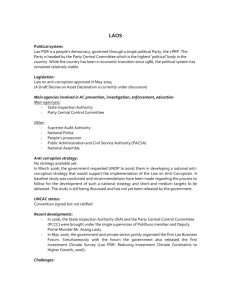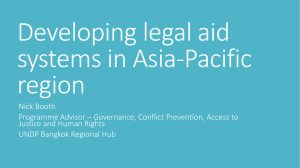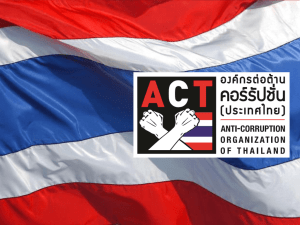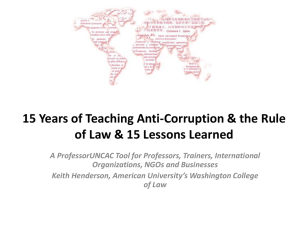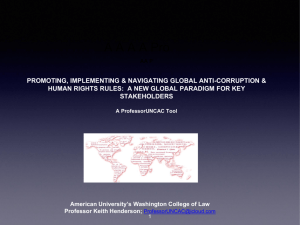VIETNAM - Anti
advertisement
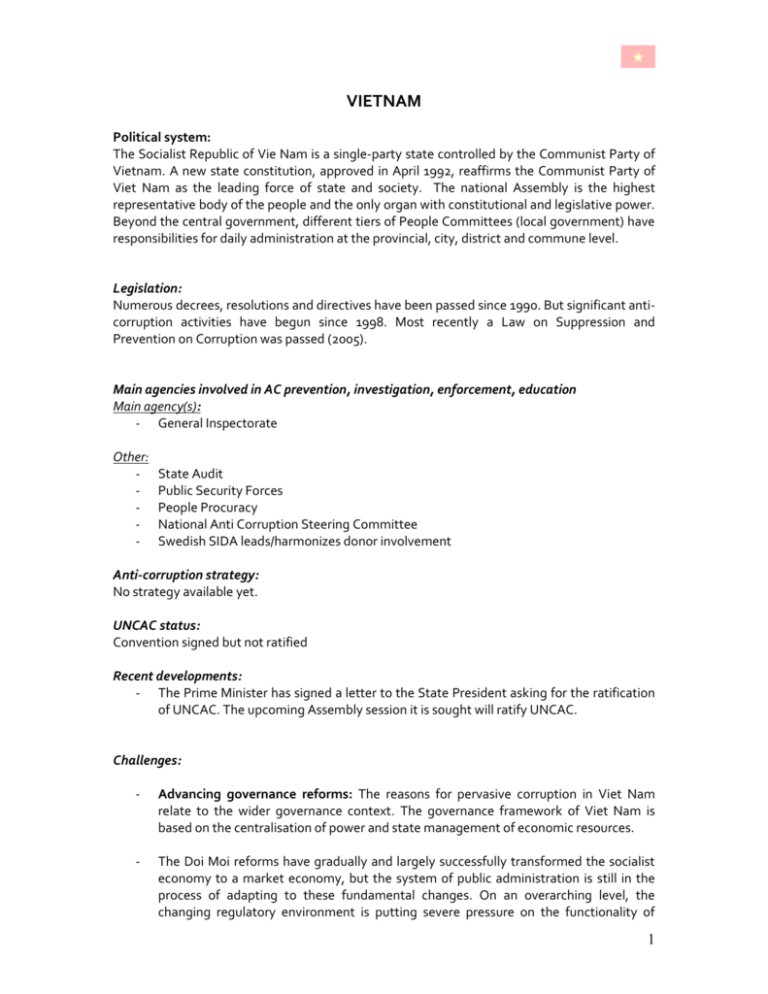
VIETNAM Political system: The Socialist Republic of Vie Nam is a single-party state controlled by the Communist Party of Vietnam. A new state constitution, approved in April 1992, reaffirms the Communist Party of Viet Nam as the leading force of state and society. The national Assembly is the highest representative body of the people and the only organ with constitutional and legislative power. Beyond the central government, different tiers of People Committees (local government) have responsibilities for daily administration at the provincial, city, district and commune level. Legislation: Numerous decrees, resolutions and directives have been passed since 1990. But significant anticorruption activities have begun since 1998. Most recently a Law on Suppression and Prevention on Corruption was passed (2005). Main agencies involved in AC prevention, investigation, enforcement, education Main agency(s): - General Inspectorate Other: - State Audit Public Security Forces People Procuracy National Anti Corruption Steering Committee Swedish SIDA leads/harmonizes donor involvement Anti-corruption strategy: No strategy available yet. UNCAC status: Convention signed but not ratified Recent developments: - The Prime Minister has signed a letter to the State President asking for the ratification of UNCAC. The upcoming Assembly session it is sought will ratify UNCAC. Challenges: - Advancing governance reforms: The reasons for pervasive corruption in Viet Nam relate to the wider governance context. The governance framework of Viet Nam is based on the centralisation of power and state management of economic resources. - The Doi Moi reforms have gradually and largely successfully transformed the socialist economy to a market economy, but the system of public administration is still in the process of adapting to these fundamental changes. On an overarching level, the changing regulatory environment is putting severe pressure on the functionality of 1 unified representative, legislative and executive functions of government. On an operational level, the problems encountered include unclear, undefined, duplicated or redundant functions and responsibilities of ministries and agencies; the limited control of the central government over the public expenditure, particularly at a sub-national level; limited capacity and lacking professionalism of civil servants and public bodies; and split administrative authority between the local, provincial and national level; all of which are conducive to a complex, inefficient and opaque system of supervision, accountability, reporting and allocation of public resources - Implementing the policy and legal framework on anti-corruption: In 2003, the Central Committee of the Party passed a resolution to develop a new, comprehensive anti-corruption strategy. A diagnostic study on corruption in Viet Nam was conducted by the Central Committee on Internal Affairs in 2005, marking the first comprehensive empirical analysis of the spread and types of corruption in Vietnam. The passing of the new Law on Suppression and Prevention on Corruption in 2005, and related implementing decrees, represent a significant contribution to the legal framework on anti-corruption, as will the operationalisation of the recently established steering committee on anti-corruption. However, while it can generally be said that Viet Nam has a relatively well developed set of laws, regulations and oversight bodies, the key challenge remains their implementation. - Empowering civil society; Realistically, the centralisation of the political system will not allow for real independence or a comprehensive system of checks and balances in the near to mid-term future, but the achievements with regard to changing structures of accountability and oversight (e.g. new powers of elected bodies) point in an encouraging direction. The true challenge to Viet Nam lies in the development of a civil society, which is empowered, informed and protected enough to exert individual and organised pressure on the political and administrative authorities. Reforms of the system will only become effective and filled with substance when the citizens begin to use the tools available UNDP’s involvement: The established relations with the government, the administration and the legislative bodies, and the trust UNDP has gained within the Vietnamese society over the past two decades have proven important preconditions for engaging with key sectors of government and society. Currently UNDP contributes to the prevention of corruption through its programmes within the judiciary field (encompassing capacity-building in the judiciary, strengthening the independence of law enforcement agencies) and through UNDPs public administration reform programme. The first concrete anti corruption project however, is still in its formulation stage. Collaboration with the General Inspectorate is to ensure the implementation of the UNCAC, once it is ratified. Partnerships with other development partners in the fight against corruption: In the past, corruption was deemed to be a highly sensitive issue in Vietnam. Sweden, for historical reasons, has established close relations with key public decision-makers, and has for several years addressed measures to prevent corruption with the government authorities. This 2 relationship has been underlined by the government, which has accorded Sida the lead in coordinating donors with regard to anti-corruption policies. Sida funded a diagnostic study carried out by the Party in 2004-05 and also provided technical advice to the drafting of the Law on Suppression and Prevention of Corruption (together with UNDP). A comprehensive capacity building programme for the strengthening of the inspectorate system, spearheaded by Sida with funding from Denmark, Norway and the Netherlands, was approved in October 2006. Denmark provided support to the process of ratification of the UNCAC. UNDP and UNODC did also support this process, albeit trough different channels and means. UNDOC does also have the ambition to support its implementation but have arguably limited capacities in place at the country level to do so effectively. The World Bank, internationally the lead agency in the conceptual and diagnostic development of anti-corruption policies, views its role in Viet Nam more as a technical advisor on request, not as a provider of substantive policy. However, the conditions/triggers attached to Poverty Reduction Strategy Credit of the World Bank might act as a strong push-factor for further reforms. ADB is involved in the implementation of the ADB/OECD Action Plan Against Corruption. Contact person in UNDP: Constance Hybsier (Program Officer): constance.hybsier@undp.org 3
